Letters from Ronald Lennox Henderson to his mother, 1916 - Part 1
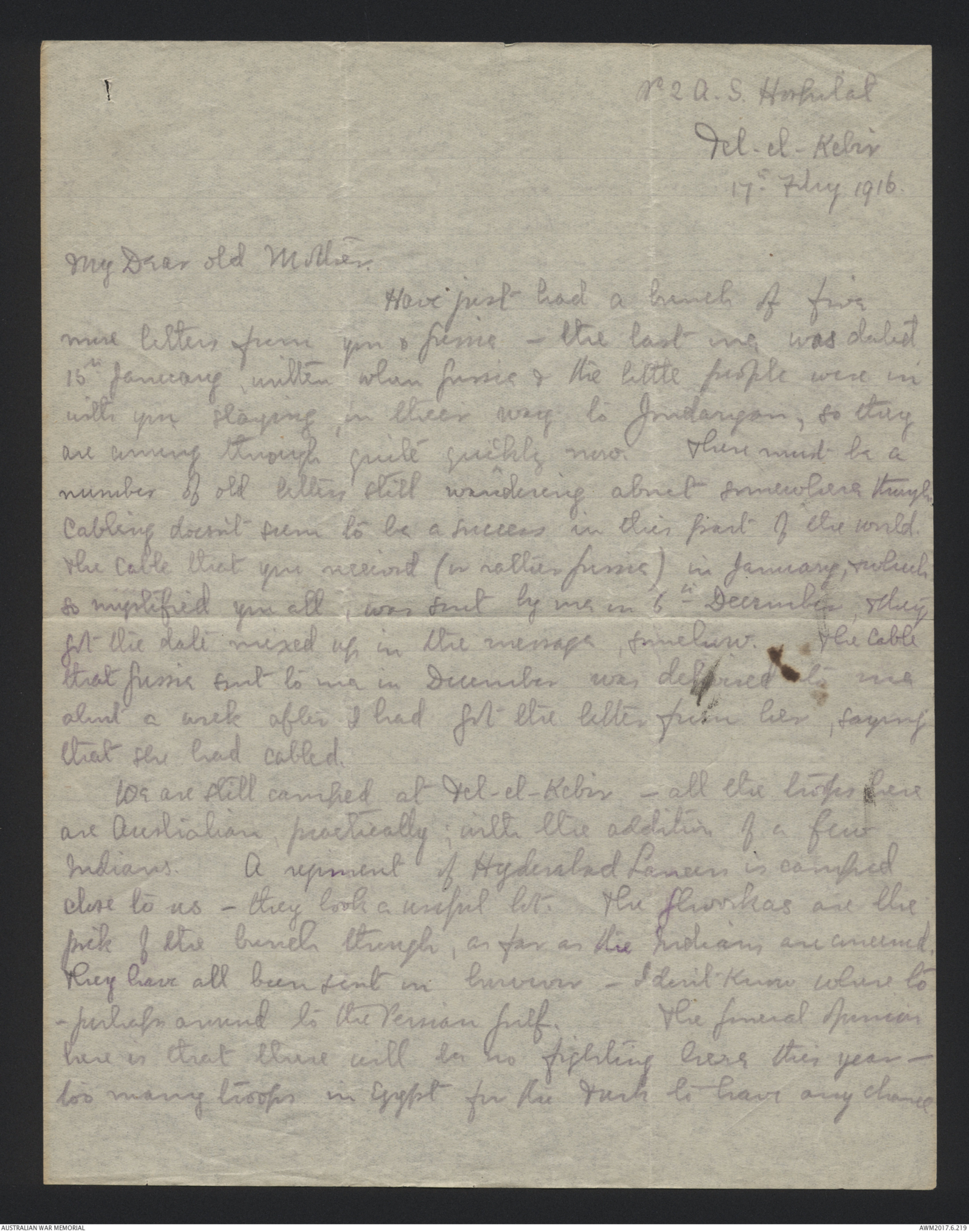
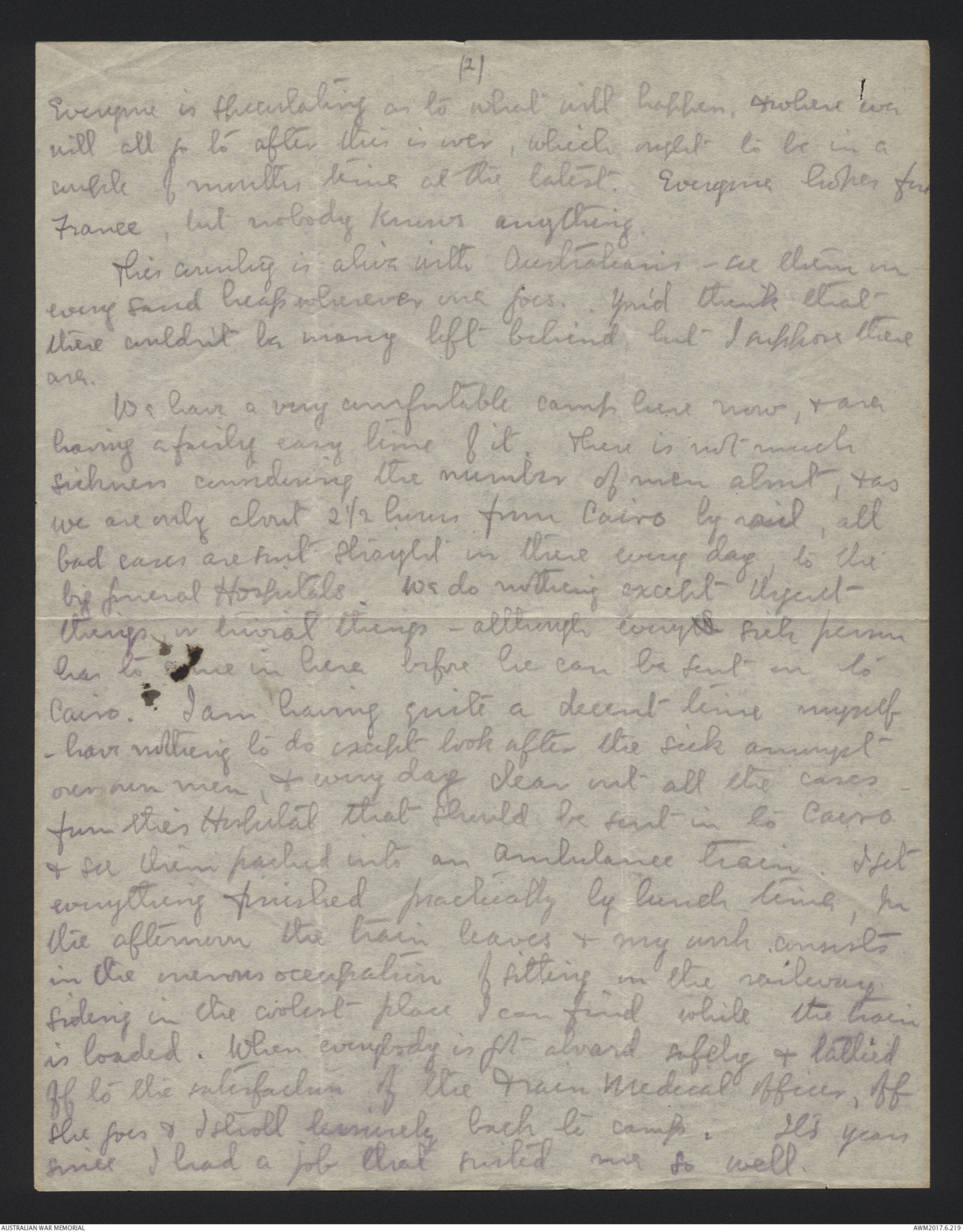
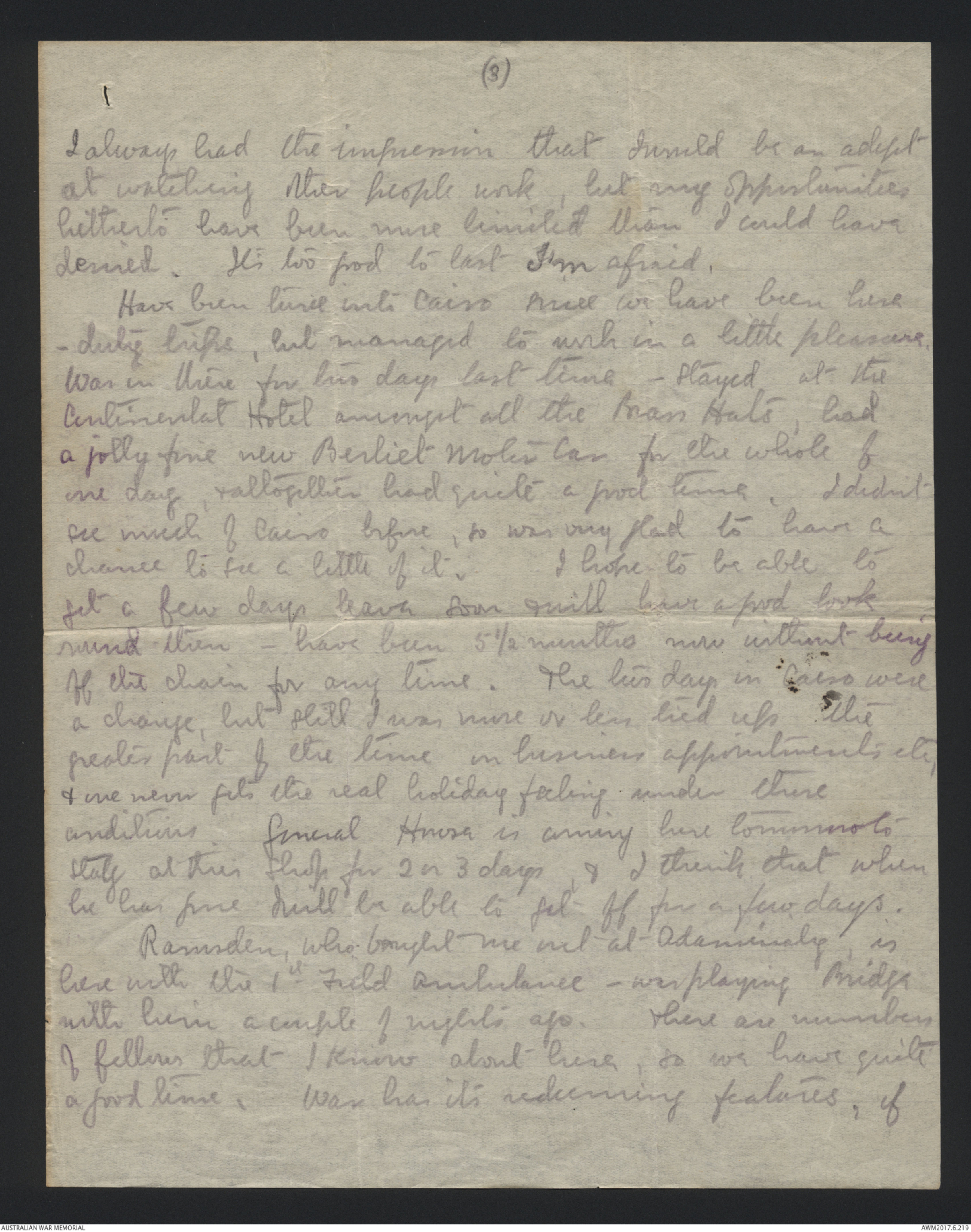
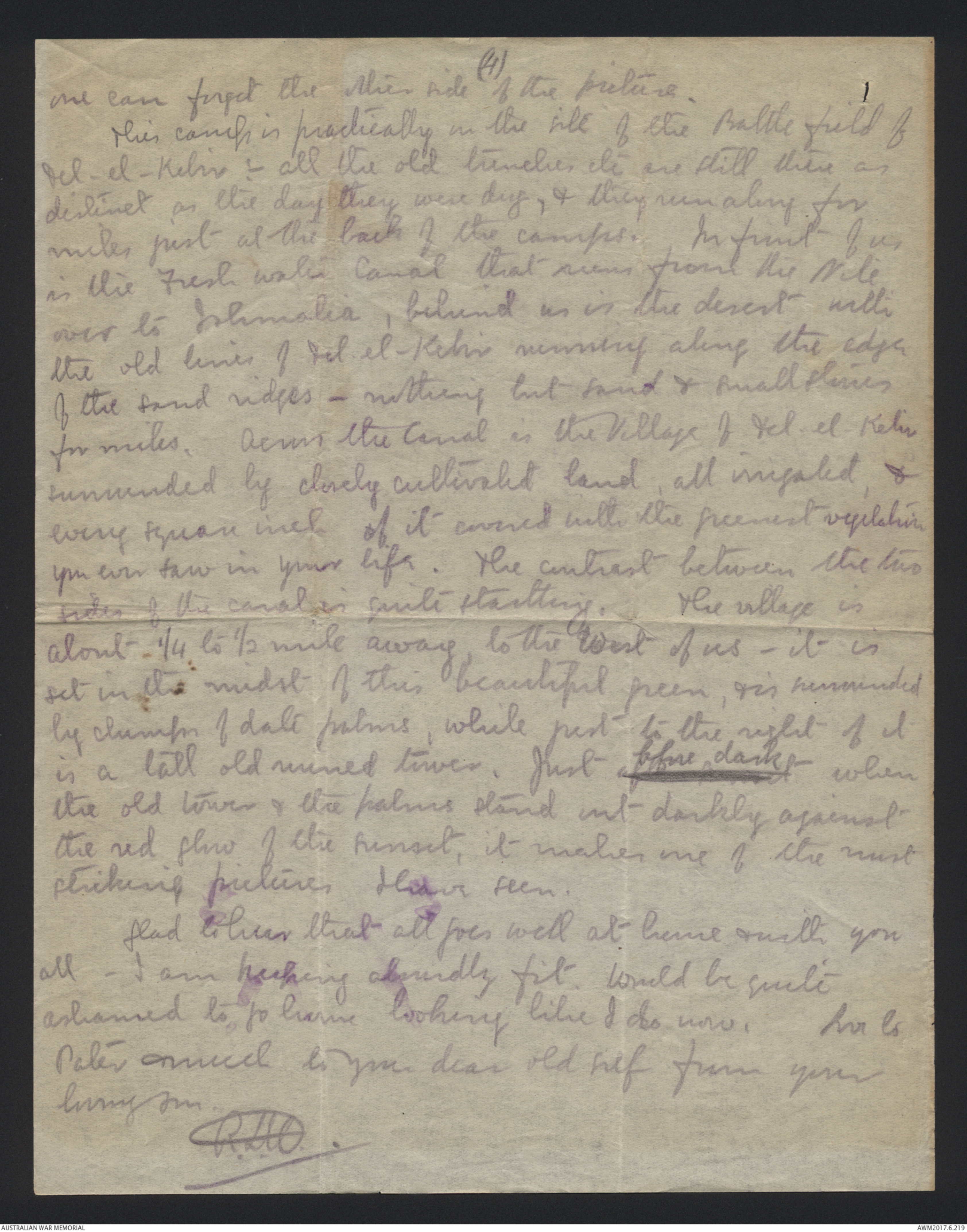
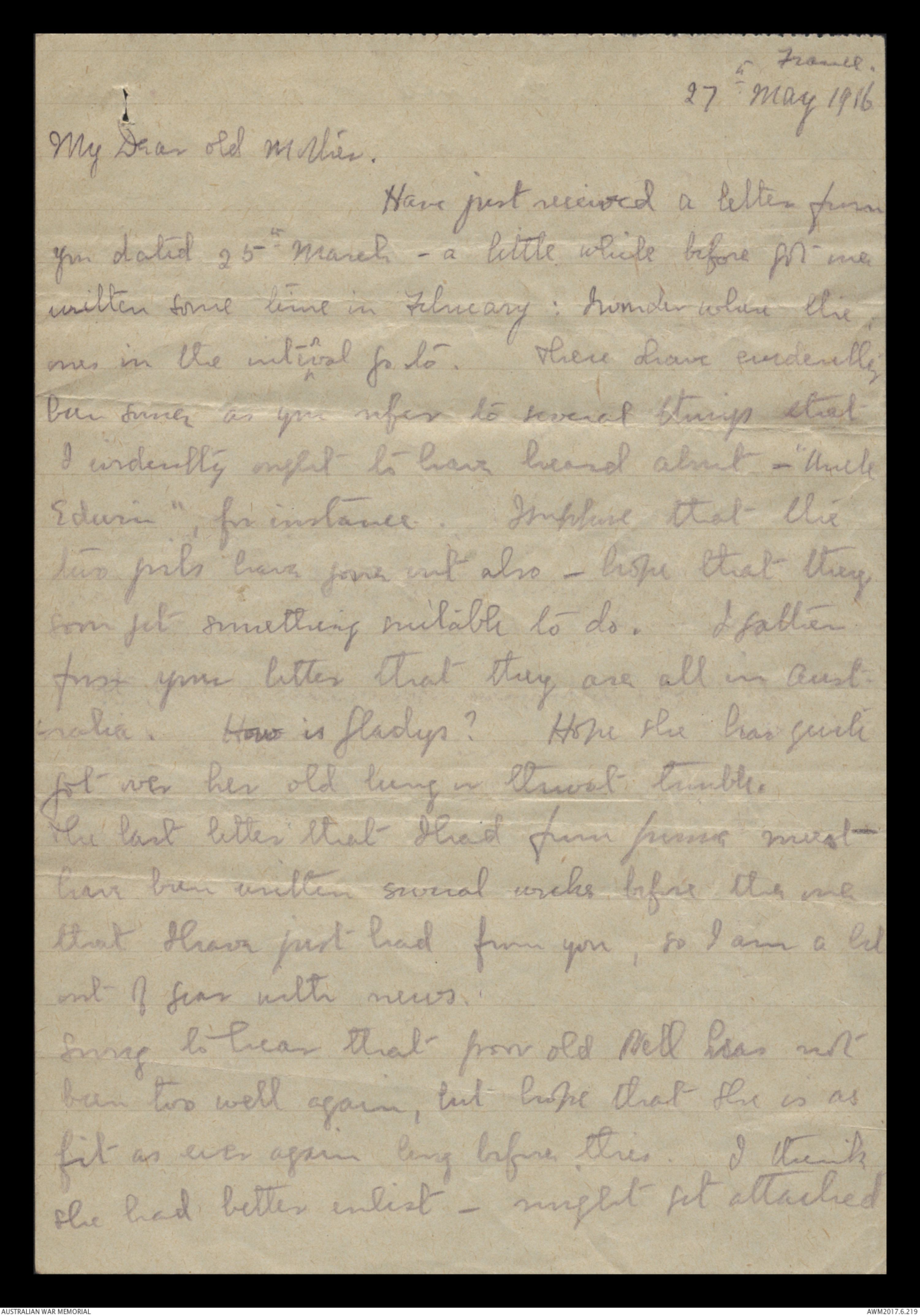
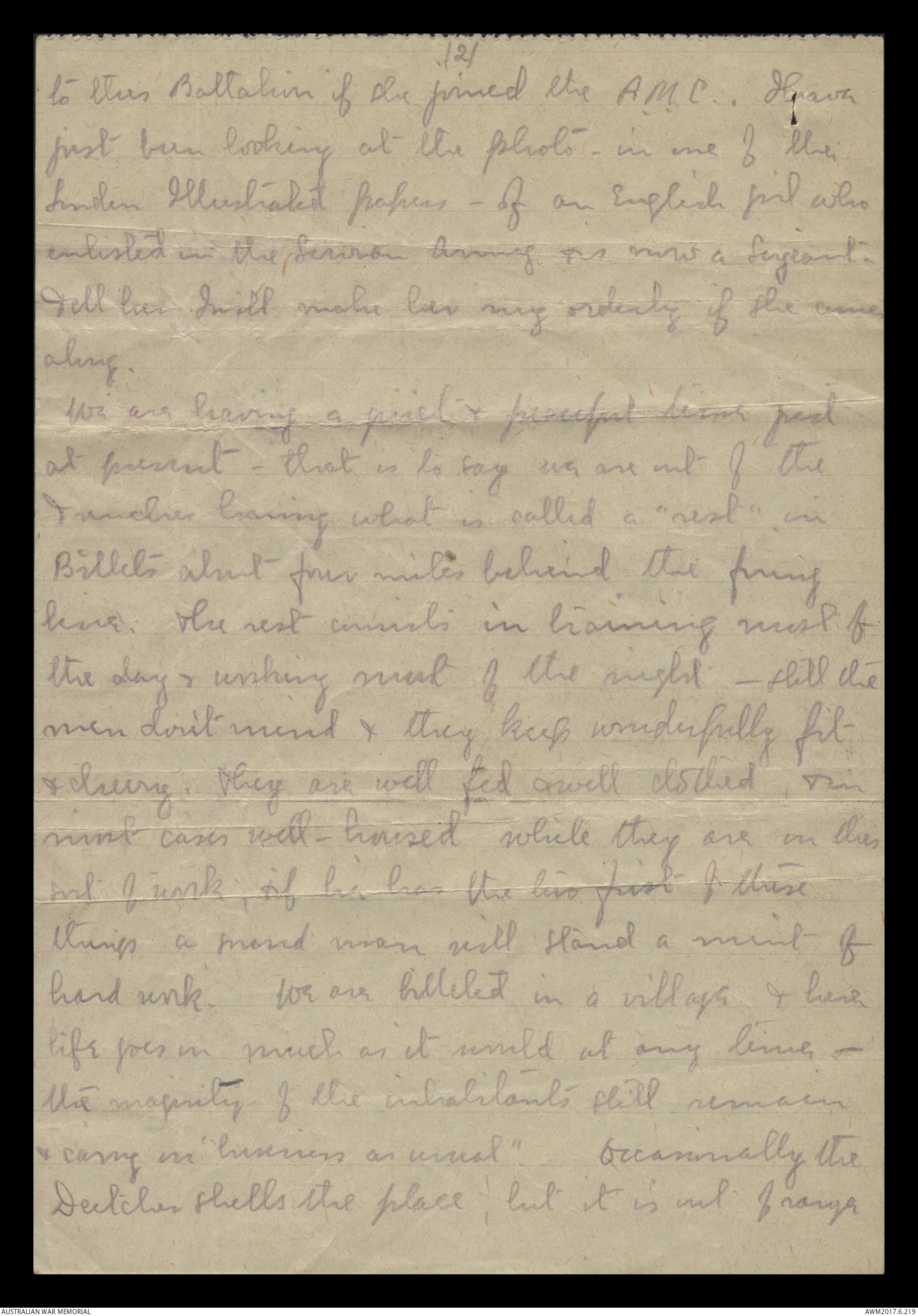
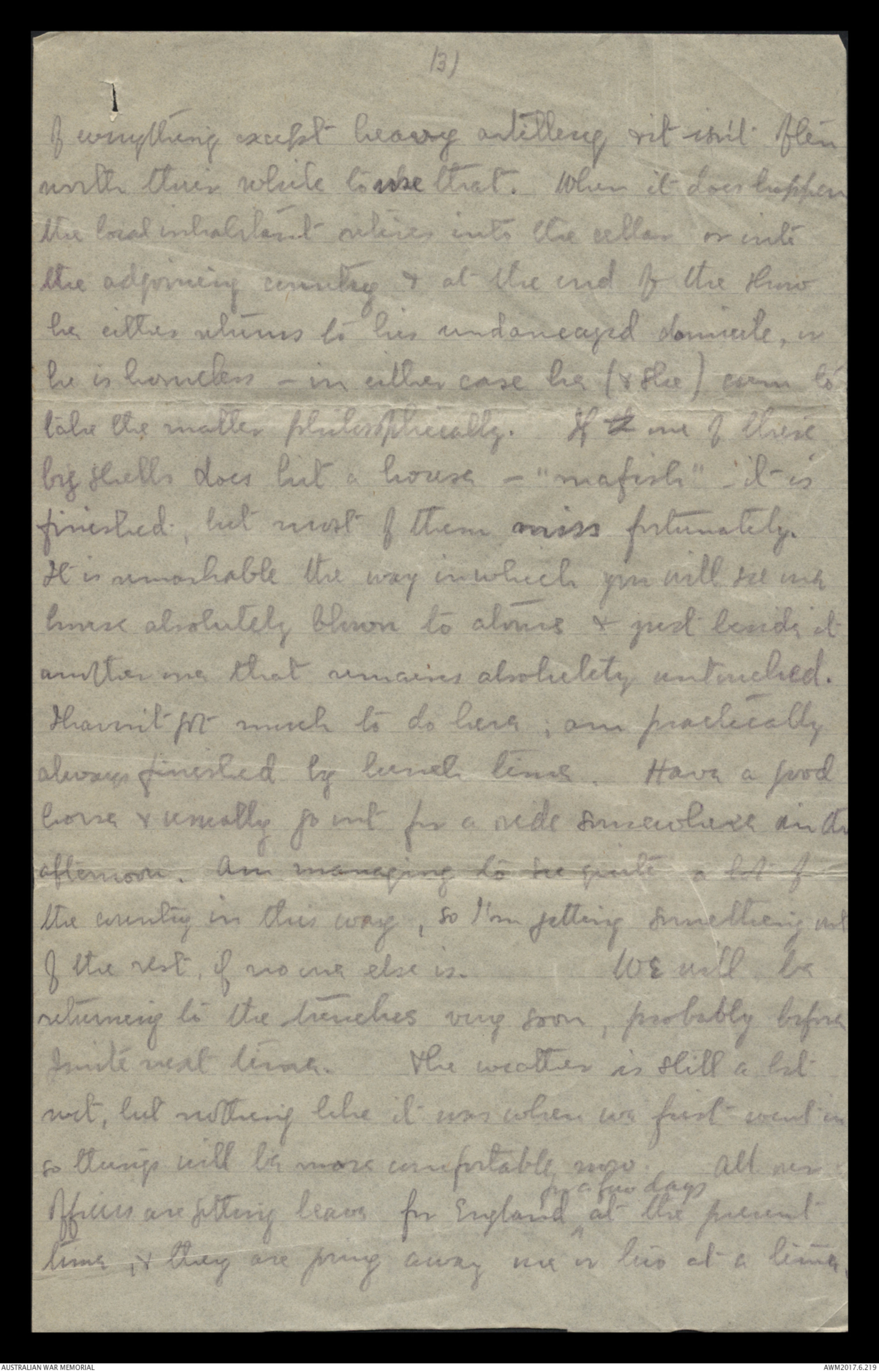
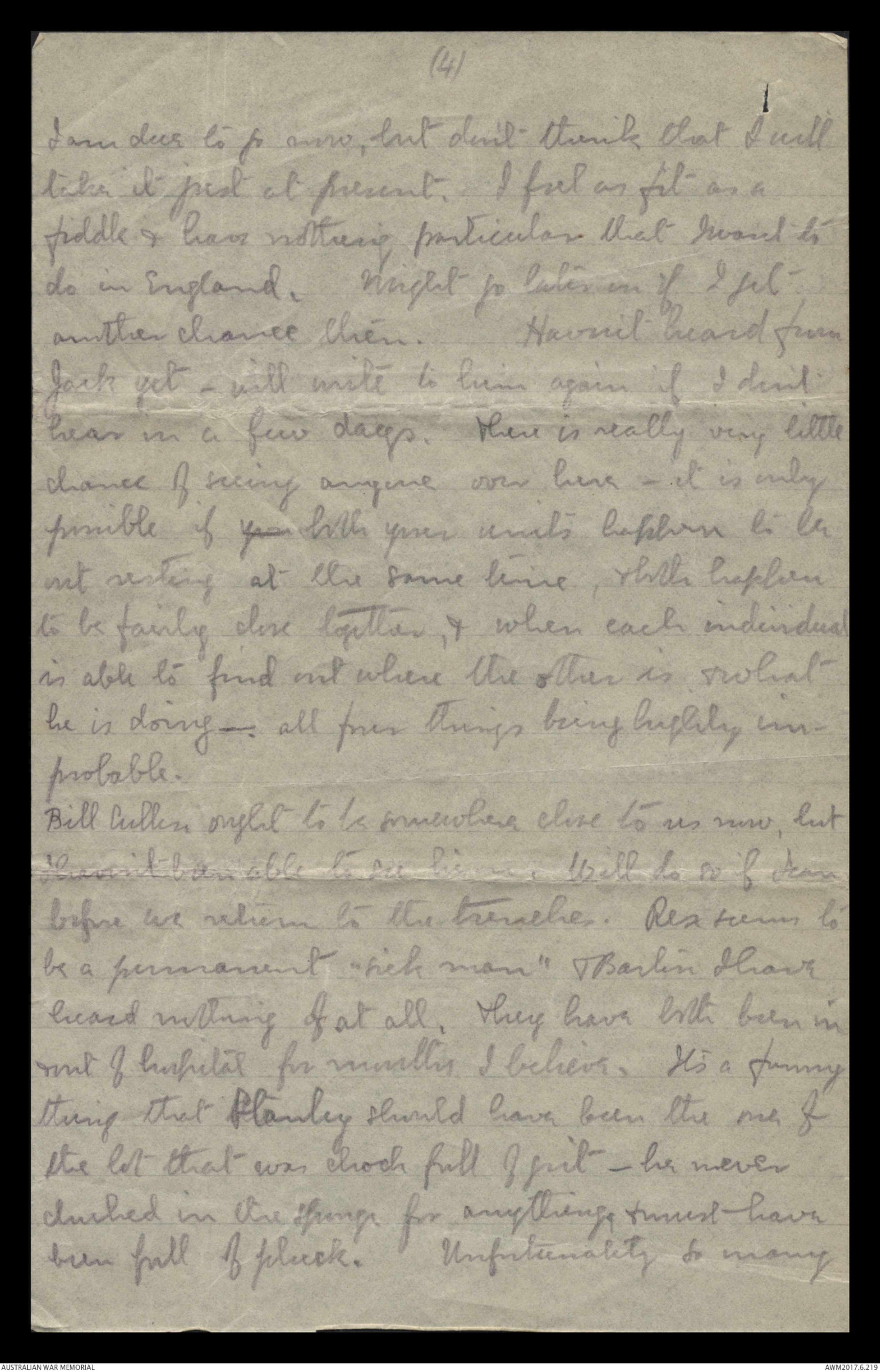
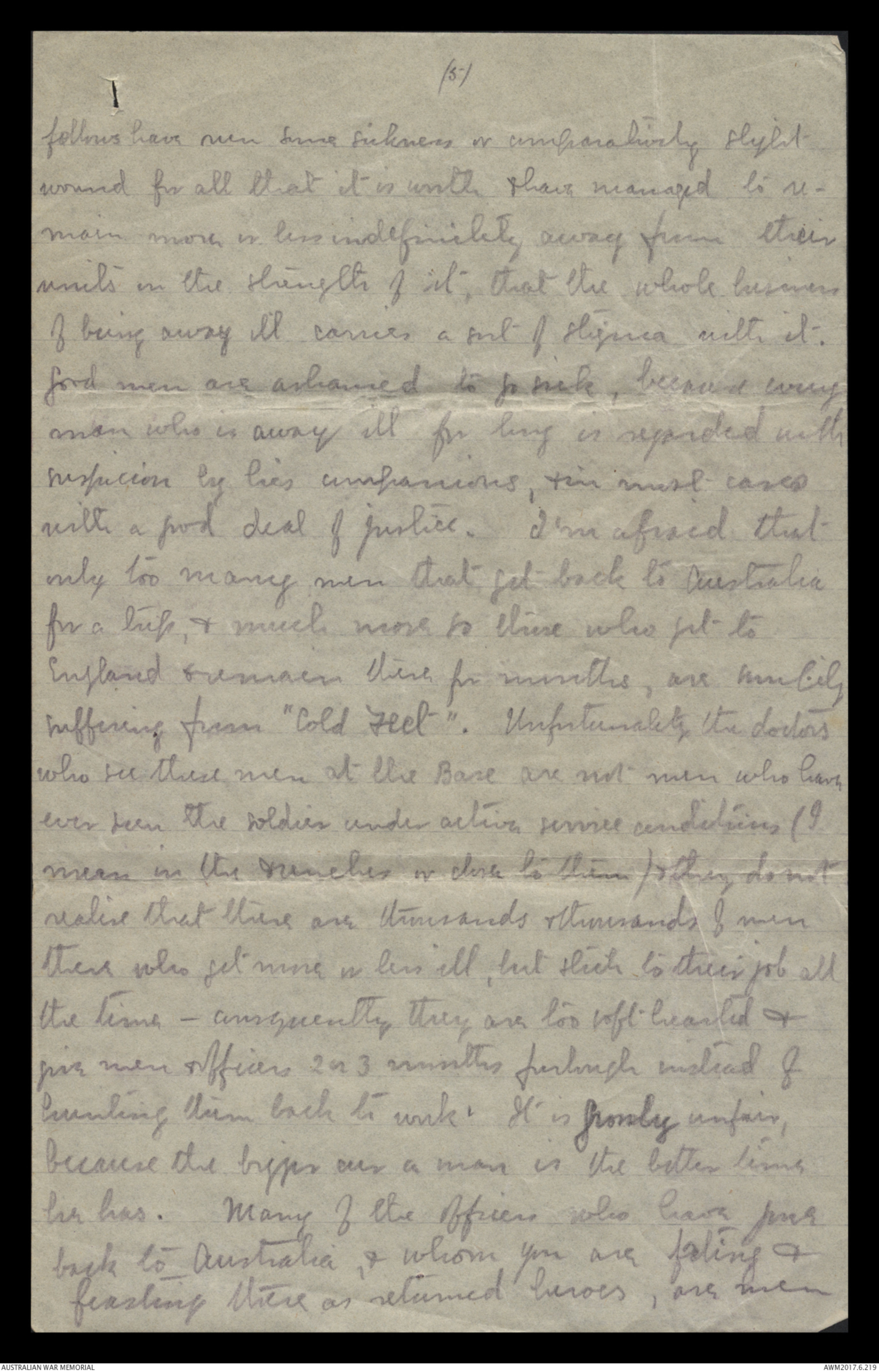
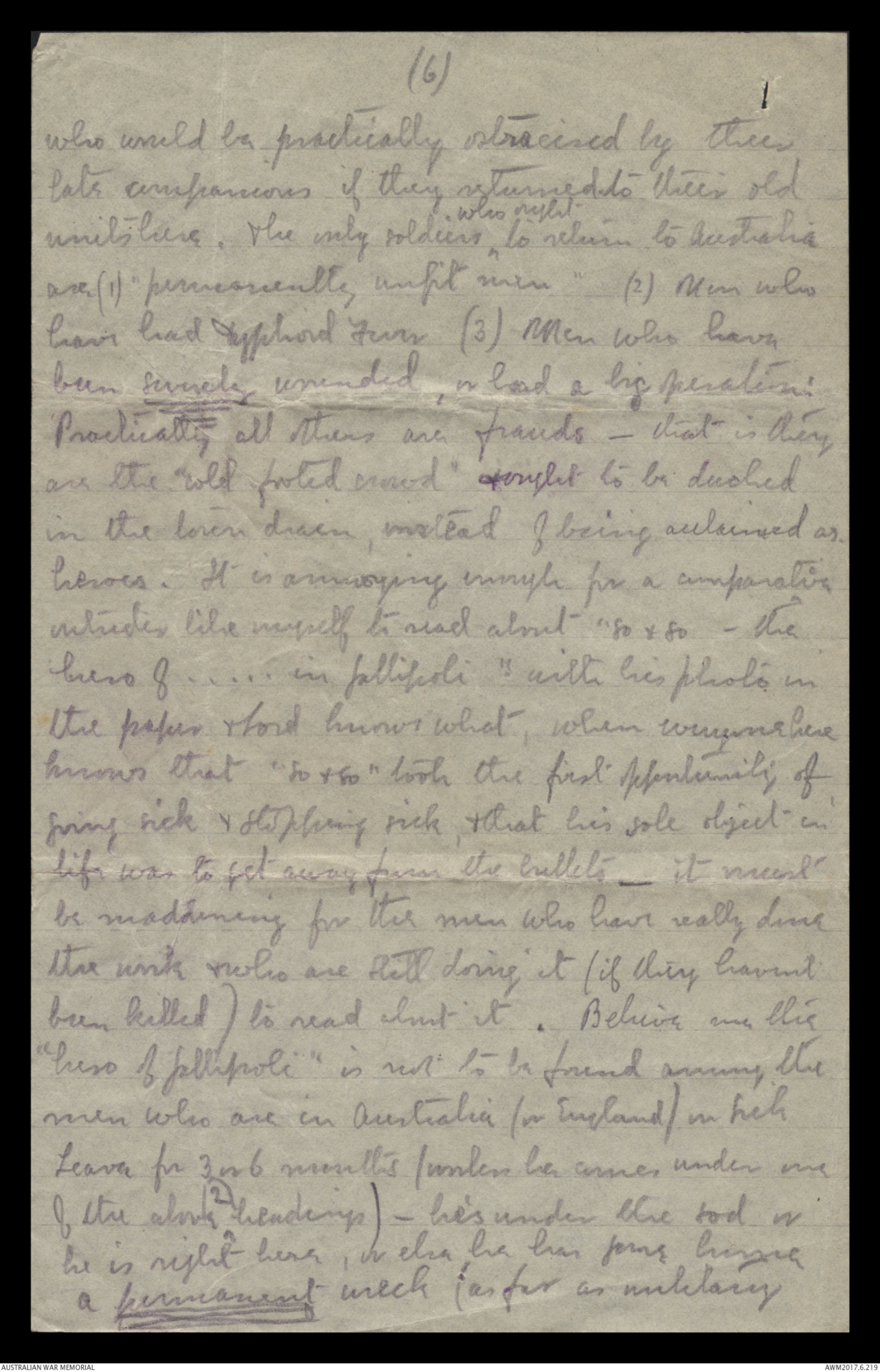
No 2 A.S. Hospital
Tel-el-Kebir
17th Fbry 1916.
My Dear old Mother,
Have just had a bunch of five
more letters from you & Gussie - the last one was dated
16th January, written when Gussie & the little people were in
with you staying, on their way to Jondaryan, so they
are coming through quite quickly now. There must be a
number of old letters still wandering about somewhere though.
Cabling doesn't seem to be a success in this part of the world.
The Cable that you received (or rather Gussie) in January, & which
so mystified you all, was sent by me on 6th December, & they
got the date mixed up in the message, somehow. The Cable
that Gussie sent to me in December was delivered to me
about a week after I had got the letter from her, saying
that she had cabled.
We are still camped at Tel-el-Kebir - all the troops here
are Australian, practically; with the addition of a few
Indians. A regiment of Hyderabad Lancers is camped
close to us - they look a useful lot. The Ghurkas are the
pick of the bunch though, as far as the Indians are concerned.
They have all been sent on however - I don't know where to
- perhaps around to the Persian Gulf. The general opinion
here is that there will be no fighting here this year —
too many troops in Egypt for the Turk to have any chance.
(2)
Everyone is speculating as to what will happen, & where we
will all go to after this is over, which ought to be in a
couple of months time at the latest. Everyone hopes for
France, but nobody knows anything.
This country is alive with Australians - see them in
every sand heap wherever one goes. You'd think that
there couldn't be many left behind, but I suppose there
are.
We have a very comfortable camp here now, & are
having a fairly easy time of it. There is not much
sickness considering the number of men about, & as
we are only about 2½ hours from Cairo by rail, all
bad cases are sent straight on there every day, to the
big General Hospitals. We do nothing except Urgent
things, or trivial things – although every bo sick person
has to come in here before he can be sent on to
Cairo. I am having quite a decent time myself
- have nothing to do except look after the sick amongst
our own men, & every day clear out all the cases
from this Hospital that should be sent in to Cairo
& see them packed into an Ambulance train. I get
everything finished practically by lunch time, In
the afternoon the train leaves & my work consists
in the onerous occupation of sitting in the railway
siding in the coolest place I can find while the train
is loaded. When everybody is got aboard safely & tallied
off to the satisfaction of the Train Medical Officer, off
she goes & I stroll leisurely back to camp. It's years
since I had a job that suited me so well.
(3)
I always had the impression that I would be an adept
at watching other people work, but my opportunities
hitherto have been more limited than I could have
desired. It's too good to last I'm afraid.
Have been twice into Cairo since we have been here
- duty trips, but managed to work in a little pleasure.
Was in there for two days last time - stayed at the
Continental Hotel amongst all the Brass Hats, had
a jolly fine new Berliet Motor Car for the whole of
one day, & altogether had quite a good time. I didn't
see much of Cairo before, so was very glad to have a
chance to see a little of it. I hope to be able to
get a few days leave soon & will have a good look
round then - have been 5½ months now without being
off the chain for any time. The two days in Cairo were
a change, but still I was more or less tied up the
greater part of the time in business appointments etc,
& one never gets the real holiday feeling under these
conditions. General Howse is coming here tomorrow to
stay at this shop for 2 or 3 days, & I think that when
he has gone I will be able to get off for a few days.
Ramsden, who brought me out at Adaminaby, is
here with the 1st Field Ambulance - was playing Bridge
with him a couple of nights ago. There are numbers
of fellows that I know about here, so we have quite
a good time. War has its redeeming features, if
(4)
one can forget the other side of the picture.
This camp is practically on the side of the Battle field of
Tel-el-Kebir:- all the old trenches etc are still there as
distinct as the day they were dug, & they run along for
miles just at the back of the camps. In front of us
is the Fresh water Canal that runs from the Nile
over to Ishmalia, behind us is the desert with
the old lines of Tel-el-Kebir running along the edge
of the sand ridges - nothing but sand & small stones
for miles. Across the Canal is the Village of Tel-el-Kebir
surrounded by closely cultivated land, all irrigated, &
every square inch of it covered with the greenest vegetation
you ever saw in your life. The contrast between the two
sides of the canal is quite startling. The village is
about ¼ to ½ mile away, to the West of us - it is
set in the midst of this beautiful green, & is surrounded
by clumps of date palms, while just to the right of it
is a tall old ruined tower. Just after sunset before dark when
the old tower & the palms stand out darkly against
the red glow of the sunset, it makes one of the most
striking pictures I have seen.
Glad to hear that all goes well at home & with you
all - I am keeping absurdly fit. Would be quite
ashamed to go home looking like I do now. Love to
Pater & much to your dear old self from your
loving son.
R.L.H.
France.
27th May 1916
My Dear old Mother,
Have just received a letter from
you dated 25th March - a little while before got one
written some time in February. I wonder where the
ones in the interval go to. There have evidently
been some as you refer to several things that
I evidently ought to have heard about - "Uncle
Edwin", for instance. I suppose that the
two girls have gone out also - hope that they
soon get something suitable to do. I gather
from your letter that they are all in Australia.
How is Gladys? Hope she has quite
got over her old lung n throat trouble.
The last letter that I had from Gussie must
have been written several weeks before the one
that I have just had from you, so I am a bit
out of gear with news.
Sorry to hear that poor old Nell has not
been too well again, but hope that she is as
fit as ever again long before this. I think
she had better enlist - might get attached
(2)
to this Battalion if she joined the A.M.C. I have
just been looking at the photo - in one of the
London Illustrated papers - of an English girl who
enlisted in the [[?]] Army & is now a Sergeant.
Tell her I will make her my orderly if she came
along.
We are having a quiet & peaceful time just
at present - that is to say we are out of the
trenches having what is called a "rest" in
Billets about four miles behind the firing
line. The rest consists in training most of
the day & working most of the night - still the
men don't mind & they keep wonderfully fit
& cheery. They are well fed & well clothed, & in
most cases well-housed while they are on this
sort of work, & if he has the two first of these
things a sound man will stand a mint of
hard work. We are billeted in a village & here
life goes on much as it would at any time –
the majority of the inhabitants still remain
& carry on "business as usual". Occasionally the
Deitcher shells the place, but it is out of range
(3)
of everything except heavy artillery & it isn't often
worth their while to use that. When it does happen
the local inhabitant retires into the cellar or into
the adjoining country & at the end of the show
he either returns to his undamaged domicile, or
he is homeless - in either case he (& she) come to
take the matter philosophically. If th one of these
big shells does hit a house - "mafish" - it is
finished, but most of them miss fortunately.
It is remarkable the way in which you will see one
house absolutely blown to atoms & just beside it
another one that remains absolutely untouched.
I haven't got much to do here; am practically
always finished by lunch time. Have a good
horse & usually go out for a ride somewhere in the
afternoon. Am managing to see quite a lot of
the country in this way, so I'm getting something out
of the rest, if no one else is. We will be
returning to the trenches very soon, probably before
I write next time. The weather is still a bit
wet, but nothing like it was when we first went in
so things will be more comfortable now. All our
officers are getting leave for England for a few days at the present
time, & they are going away one or two at a time
(4)
I am due to go also, but don't think that I will
take it just at present. I feel as fit as a
fiddle & have nothing particular that I want to
do in England. Might go later on if I get
another chance then. Haven't heard from
Jack yet – will write to him again if I don't
hear in a few days. There is really very little
chance of seeing anyone over here – it is only
possible if you both your units happen to be
out resting at the same time, & both happen
to be fairly close together, & when each individual
is able to find out where the other is & what
he is doing - all four things being highly improbable.
Bill Cullen ought to be somewhere close to us now, but
haven't been able to see him. Will do so if I can
before we return to the trenches. Rex seems to
be a permanent "sick man" & Barlin I have
heard nothing of at all. They have both been in
& out of hospital for months I believe. It's a funny
thing that Stanley should have been the one of
the lot that was chock full of grit - he never
chucked in the sponge for anything & must have
been full of pluck. Unfortunately so many
(5)
fellows have run some sickness or comparatively slight
wound for all that it is worth & have managed to re-
main more or less indefinitely away from their
units on the strength of it, that the whole business
of being away ill carries a sort of stigma with it.
Good men are ashamed to go sick, because every
man who is away ill for long is regarded with
suspicion by his companions, & in most cases
with a good deal of justice. I'm afraid that
only too many men that get back to Australia
for a trip, & much more so those who get to
England & remain there for months, are usually
suffering from "Cold Feet". Unfortunately the doctors
who see these men at the Base are not men who have
ever seen the soldier under active service conditions (I
mean in the trenches or close to them) & they do not
realise that there are thousands & thousands of men
there who get more or less ill, but stick to their job all
the time – consequently they are too soft-hearted &
give men & officers 2 or 3 months furlough instead of
hunting them back to work. It is grossly unfair,
because the bigger cur a man is the better time
he has. Many of the officers who have gone
back to Australia, & whom you are fěting &
feasting there as returned heroes, are men
(6)
who would be practically ostracised by their
late companions if they returned to their old
units here. The only soldiers who ought to return to Australia
are (1) "permanently unfit men" (2) Men who
have had Typhoid Fever (3) Men who have
been severely wounded, or had a big operation!
Practically all others are frauds - that is they
are the "cold footed crowd" & ought to be ducked
in the town drain, instead of being acclaimed as
heroes. It is annoying enough for a comparative
intruder like myself to read about "so & so – the
hero of . . . . . in Gallipoli " with his photo in
the papers & Lord knows what, when everyone here
knows that "so & so" took the first opportunity of
going sick & stopping sick, that his sole object in
life was to get away from the bullets - it must
be maddening for the men who have really done
the work & who are still doing it (if they haven't
been killed) to read about it. Believe me this
"hero of Gallipoli" is not to be found among the
men who are in Australia (or England) on sick
Leave for 3 or 6 months (unless he comes under one
of the above (2) headings) – he's under the sod or
he is right here, or else he has gone home
a permanent wreck (as far as military
 Jacqueline Kennedy
Jacqueline KennedyThis transcription item is now locked to you for editing. To release the lock either Save your changes or Cancel.
This lock will be automatically released after 60 minutes of inactivity.